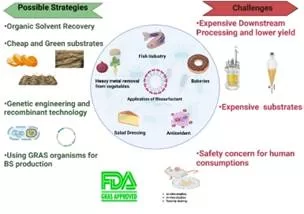In an exciting development for the food industry, cost-effective and eco-friendly microbial biosurfactants are emerging as a healthier alternative to synthetic surfactants. These naturally derived biosurfactants, produced using green substrates from agro-industrial waste, offer a safer and more sustainable option for various food applications.
Surfactants, which are molecules that facilitate the mixing of oil and water, play a critical role in the food industry. They are commonly used as emulsifiers to stabilize mixtures, improve the shelf life of products, act as lubricants and foamers, and serve as dispersing agents that retain moisture in food products. However, the widespread use of synthetic surfactants has raised significant concerns. These artificial additives can disrupt the body’s microbiome, leading to gut-related disorders, increased intestinal permeability, and a decline in beneficial microbiota.
Recognizing the need for safer alternatives, researchers have turned to microbial biosurfactants. Derived from various microbial sources, these biosurfactants exhibit high emulsification, solubilization, foaming, and adsorption properties. Additionally, they are stable across a wide range of pH, temperature, and salinity, making them ideal for use in food products. Importantly, biosurfactants are biodegradable and non-toxic, ensuring they are safe for human consumption.
A research team led by Prof. Ashis K. Mukherjee, Director of the Institute of Advanced Study in Science and Technology (IASST), Guwahati, along with Prof. M. R. Khan and Anushree Roy, conducted a comprehensive analysis of biosurfactants’ applications in the food industry. Their study, published in the journal Food Control (Elsevier), highlights the potential of biosurfactants to revolutionize the food industry by offering a green and sustainable alternative to synthetic surfactants.
The researchers emphasize the versatility of biosurfactants in food applications. Beyond their use in bakeries and salad dressings, biosurfactants can be employed to remove heavy metals from vegetables, enhance fish immunity, and protect against pathogens. Furthermore, they can act as natural antioxidants, preventing the early spoilage of food products.
One of the study’s key findings is the potential for producing cost-effective biosurfactants using green substrates derived from agro-industrial waste. The researchers also explored the use of genetic engineering, recombinant DNA technologies, and nanotechnology to enhance biosurfactant yield, making them more commercially viable. However, the study calls for further research into the toxicological aspects of biosurfactants, dose assessments, and their synergistic effects with other food components to ensure safe integration into food products.
The research team stresses the importance of collaboration between scientists and industry stakeholders to advance the production of biosurfactants and expand their market presence. By focusing on safety assessments and developing state-of-the-art, cost-effective technologies, biosurfactants can become a mainstream solution in the food industry, offering a healthier and more sustainable alternative to synthetic additives.
For more details, the full study can be accessed at this link.












